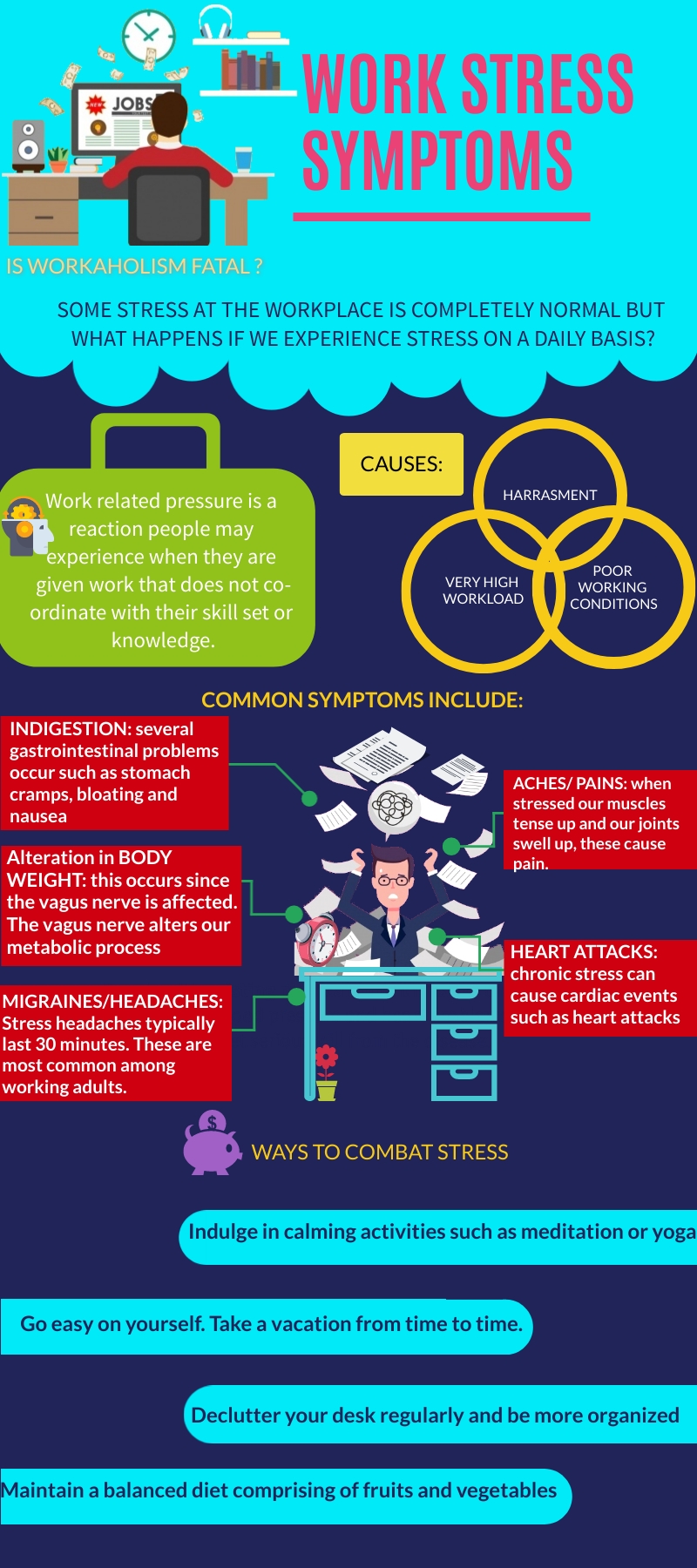Work Stress Symptoms and Ways to Cope With It (+ Infographic)

In this day and age, where everyone seems caught up in the rat race of life, it is extremely important that we pause and reflect on the dire consequences our lifestyle might be having on our physical and mental health.
Overworking might lead to a range of health complications; employees tend to be sleep- deprived, which in the long run can cause heart attacks or strokes.
Stress is a conventional physical and psychological response that can stem from an event or an idea and can cause one to experience frustration, nervousness, or indigestion.
There are symptoms about the harmful effects that work stress has on our body, and it manifests itself in different ways. When stressed, we get anxious and indulge in pessimistic self-talk. In such situations, we develop a faster heart rate, and stress hormones like cortisol and adrenaline provide us with abundant energy to run errands or pull an all-nighter and finish the task assigned to us. However, continuous work stress not only chips away our vitality but also creates a negative impact on companies and organizations.
Read also: 7 Ways by Which Stress Harms Your Health
What is Work Stress?
- Work stress is still a very evasive concept to most despite the abundant information research scientists have put out there.
- Work-related pressure or stress is a reaction individuals may experience when they are assigned with work that does not coordinate with their skill set or knowledge.
- Stress levels skyrocket when employees get little respect and support from their colleagues and supervisors. Owing to the requirements of the contemporary work environment, work stress is unavoidable. While work stress can have a positive impact on the company and employees, if experienced from time to time, it can have just the opposite impact if workers are overworked and stressed daily.
What Happens in Case You Have Stressful Encounters at Work on a Daily Basis?

Chronic work-related stress can ultimately result in the following health issues:
Indigestion
- Stress can give rise to a variety of gastrointestinal issues namely bloating, lack of appetite, vomiting sensation, and cramping in the stomach. Hence to maintain gut health, it is important that we learn to keep our stress levels under control.
- When stress triggers our central nervous system to activate the fight or flight response, our digestive system also gets affected. Acid production in the stomach increases; this leads to indigestion. It can also lead to diarrhea and constipation.
- For the majority of people, stress may have a direct impact on their body weight.
- For some, stress may cause them to completely lose the desire to eat, while others may indulge in overeating to battle stress. Hence, stress can cause drastic weight loss or weight gain, and this varies from individual to individual.
- When stressed, our vagus nerve gets affected; this in turn affects our digestive and metabolic process.
Migraines Accompanied by Nausea
Research shows that everyday stress causes the most severe headaches as opposed to stress caused due to major life changes. Some people describe this headache as a clamp squeezing their skull.
Stress headaches are most common among adults. These migraines typically last about 30 minutes. Frequent episodes may become chronic.
To combat stress migraines, one must maintain a healthy lifestyle.
Aches and Pains (Chest Joint or Back Pain)
- When stressed, our muscles tense up. If we are constantly stressed, our muscles do not get the opportunity to relax. Stressed and tight muscles cause aches and pains in our bodies
- Due to the production of cytokine molecules, our joints swell up. Ultimately, this leads to acute pain in our joints.
- Relaxation techniques such as yoga and meditation should be adopted to avoid body and joint aches.
Extreme Cases May Also Lead to Heart Attacks
Researchers at Harvard University say that chronic stress could be just as harmful as smoking. Sudden stress can induce cardiac events that feel like heart attacks. This event can cause our heart to pump blood inefficiently for as long as a month.
- Chronic stress caused by relentless struggles exposes our body to unhealthy hormones persistently; this can eventually lead to heart diseases or heart attacks. If you are facing any heart-related issues, consider talking to the best cardiologist near you.
- High levels of stress experienced at work activate our sympathetic nervous system that stimulates our hormonal glands triggering the release of adrenaline and cortisol. Thus, when we experience work stress on a day-to-day basis, our bodily functions get tampered with; this can decrease our immunity and raise the odds of us developing diseases such as autoimmune disorders or heart diseases leading to heart attacks.
- In addition, we don’t find time to incorporate or maintain healthy habits such as exercise, getting adequate amounts of sleep, and eating a nutritious balanced diet.
- All these in turn prove to be detrimental to the company’s performance in the long run. Coworkers have heated arguments amongst one another, absenteeism prevails, there is little to no productivity, and employees’ work ethic becomes essentially non-existent.
The Need to be Appreciated and Respected
Scholars have long believed that being appreciated and respected by others is amongst the most important human needs. Research on the same suggests that stressful encounters are often linked to being disrespected. For instance, by being ridiculed or disrespected, by social exclusion, by illegitimate pieces of work, and so on.
These may have quite overarching consequences in terms of our physical and mental well-being. Being appreciated has been proven to increase one’s satisfaction and motivation as well as one’s physical health and well-being.
How Can We Deal with Work Stress?
Some tried and tested techniques to cope with work stress include:
- Eliminate as many irrelevant tasks as possible. This, along with offering you more time to unwind, also allows you to allocate more time where necessary.
- Understand your working rhythm. Every individual works in a different manner. Some prefer to hit the ground running, while some prefer to pull an all-nighter.
- Practice calming activities such as meditation, yoga, and exercise. This also prevents joint or back pains and heart complications.
- It is essential to be mindful of eating a more balanced diet comprising normal-sized portions of vegetables and fruits. This will help prevent indigestion and nausea.
- Recognise the unhealthy habits you have been following and fight them back. Remember your impact on other people and strive to be a role model.
- Learn to be more organized. If you carry out your work-related tasks in a streamlined manner, then there will be no mental confusion. Eventually, you will be calm.
- Accept and own your flaws. If you are not able to know yourself, then you cannot make correct decisions. However, if you accept your mistakes thereby knowing yourself, you take responsibility of your life and will be in a good position to handle work-related stress.
Simmer down and learn to see stress as more of a challenge than a setback. Lastly, remember to manage your time efficiently since it isn’t the load that breaks people down, it’s the way they carry it.
- Sep 22, 2020






